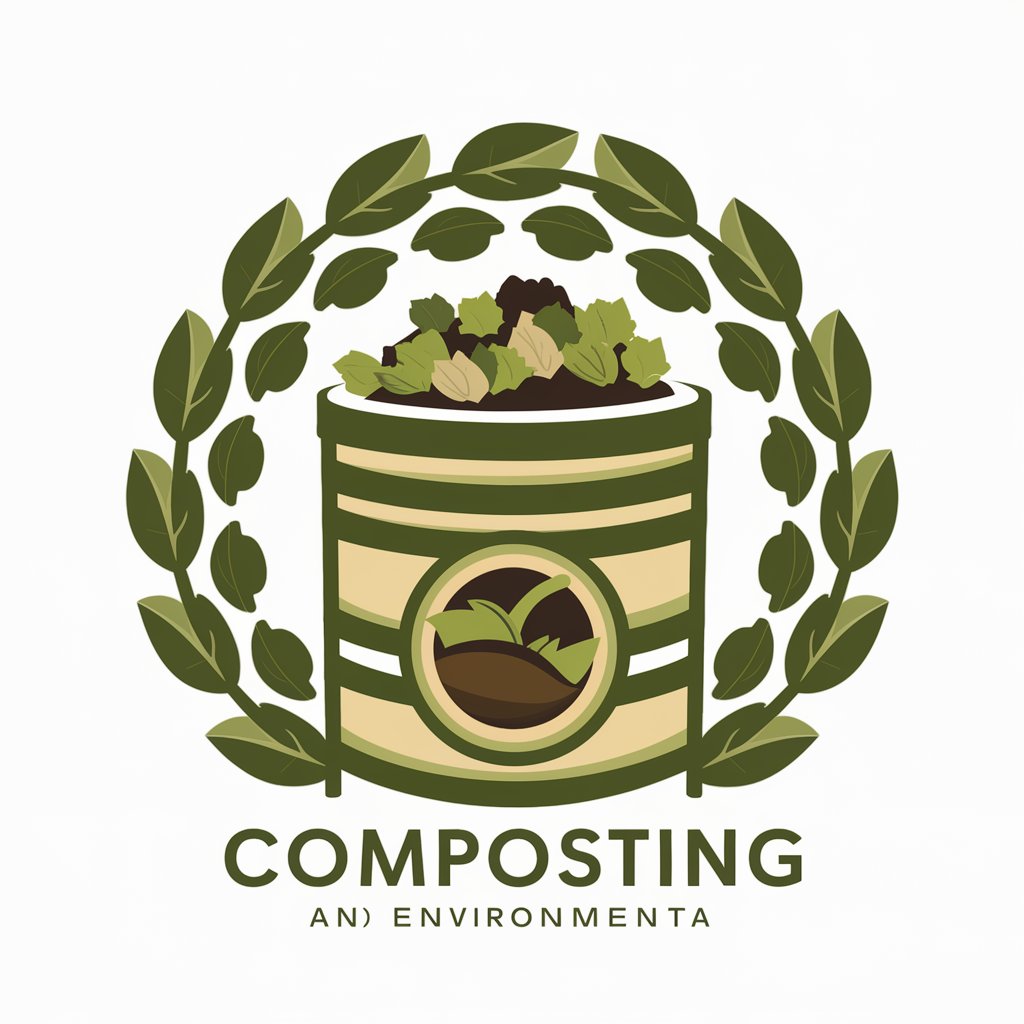Compost - Sustainable Composting Guide

Welcome! Let's explore the world of composting and sustainability together.
Turn Waste into Wealth with AI
Explain the process of home composting and its benefits.
What are the different methods of composting?
How does composting contribute to soil health and reduce waste?
Provide practical tips for starting a community composting program.
Get Embed Code
Introduction to Compost
Compost is a specialized GPT designed to delve into the world of composting, focusing on its benefits, methods, and environmental impact. Tailored for individuals and communities interested in sustainable practices, Compost aims to enrich users' understanding of composting as a crucial element in waste reduction and soil health improvement. By dissecting the science behind composting and offering practical advice, Compost serves as a comprehensive guide for effectively turning organic waste into valuable soil amendments. Examples of its utility include guiding home gardeners in setting up their compost bins, educating schools on the environmental benefits of composting, and assisting municipalities in implementing community-wide composting programs. Powered by ChatGPT-4o。

Main Functions of Compost
Educational Resource
Example
Explaining the carbon and nitrogen balance in compost piles to ensure efficient decomposition.
Scenario
A home gardener learning to adjust their compost mixture to speed up the decomposition process.
Guidance on Composting Techniques
Example
Offering insights into various composting methods such as hot composting, vermicomposting, and bokashi.
Scenario
An urban dweller deciding which composting method best fits their limited space and lifestyle.
Environmental Impact Analysis
Example
Detailing how composting reduces methane emissions from landfills by diverting organic waste.
Scenario
A community leader advocating for local composting initiatives to mitigate climate change.
Practical Composting Advice
Example
Providing step-by-step guidance on setting up and maintaining a compost pile or bin.
Scenario
A school setting up a composting system to manage cafeteria waste and educate students on sustainability.
Ideal Users of Compost Services
Home Gardeners and Urban Dwellers
Individuals seeking to reduce their waste footprint and enrich their garden soil will find Compost invaluable for practical composting advice tailored to various living situations, from spacious backyards to small apartments.
Educational Institutions
Schools and universities looking to incorporate sustainability into their curriculum can use Compost as a resource to teach students about the science of composting and its environmental benefits, fostering a culture of waste reduction and environmental stewardship.
Municipalities and Community Leaders
Leaders aiming to implement or improve waste management practices within their communities can rely on Compost for insights into establishing effective composting programs, thereby promoting public participation in sustainability efforts and reducing the community's overall environmental impact.

How to Use Compost
Start for Free
Initiate your journey by accessing a complimentary trial at yeschat.ai, enabling exploration without the need for registration or subscribing to ChatGPT Plus.
Identify Your Needs
Determine the specific composting goals or problems you're looking to address, such as reducing kitchen waste, improving soil health, or learning about compostable materials.
Collect Materials
Gather organic waste from your kitchen and garden. Ensure a balance between 'greens' (nitrogen-rich materials) and 'browns' (carbon-rich materials) for optimal composting.
Set Up Your Composting System
Choose a composting method that suits your space and needs, whether it's a compost bin, tumbler, or a simple pile in your backyard.
Maintain and Utilize
Regularly turn your compost and keep it moist. Once mature, use it to enrich your garden soil, thus closing the loop on your organic waste.
Try other advanced and practical GPTs
Swisscope
Navigate Swiss Insurance with AI Precision

"Lawyer"
Empowering your legal understanding with AI

Krypto-Guru
Empowering crypto insights through AI

Scrum Master
Empowering Teams with AI-Driven Agility

Mental Clarity Coach
Sharpen Your Mind with AI

HyperReal Prompter
Inspiring Hyper-Realism with AI Creativity

Shaving
Streamline Your Shave with AI Guidance

Marketing God
Elevate Your Marketing with AI

"Avvocatessa"
Empowering legal insights with AI

EngageTube Pro
Elevate Your YouTube Presence with AI

Tzortz
Empowering Innovation with AI Expertise

Psicólogo y Terapeuta Familiar Experto - Spa
Empowering Families with AI-Driven Therapy

Frequently Asked Questions about Compost
What materials can I compost?
You can compost organic waste, including fruit and vegetable scraps, coffee grounds, eggshells, yard trimmings, and shredded paper. Avoid composting meat, dairy, and oils to prevent odors and pests.
How long does it take for compost to mature?
Composting time can vary from a few months to a year, depending on factors such as the balance of materials, size of the pile, weather, and maintenance practices like turning and watering.
Can I compost if I live in an apartment?
Yes, indoor composting options like bokashi bins or vermicomposting (worm composting) are suitable for small spaces and can efficiently process kitchen scraps without odors.
How do I know when my compost is ready to use?
Finished compost is dark, crumbly, and has an earthy smell. It should no longer resemble the original materials and should be free of any heat generated by microbial activity.
Does composting attract pests?
Properly managed compost piles that exclude meat, dairy, and oily foods, and maintain adequate moisture and aeration, should not attract pests.
